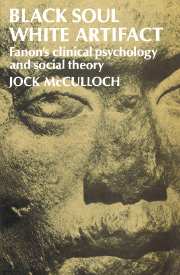Book contents
- Frontmatter
- Contents
- List of abbreviations
- Introduction
- Chapter 1 The three paradigms: negritude, ethnopsychiatry and African socialism
- Chapter 2 Negritude
- Chapter 3 Ethnopsychiatry and the psychopathology of colonialism: Fanon's account of colonised man in ‘Black Skin White Masks’
- Chapter 4 From psychiatric practice to political theory
- Chapter 5 Culture and personality
- Chapter 6 Class conflict and the liberation of Africa
- Chapter 7 The failed revolution
- Chapter 8 The neo-colonial state
- Chapter 9 Towards a critique of Fanon's class analysis
- Chapter 10 Conclusion
- Appendix I Fanon and Mannoni: conflicting psychologies of colonialism
- Appendix II Mental health in Algeria
- Notes
- Select Bibliography
- Index
Chapter 9 - Towards a critique of Fanon's class analysis
Published online by Cambridge University Press: 07 October 2009
- Frontmatter
- Contents
- List of abbreviations
- Introduction
- Chapter 1 The three paradigms: negritude, ethnopsychiatry and African socialism
- Chapter 2 Negritude
- Chapter 3 Ethnopsychiatry and the psychopathology of colonialism: Fanon's account of colonised man in ‘Black Skin White Masks’
- Chapter 4 From psychiatric practice to political theory
- Chapter 5 Culture and personality
- Chapter 6 Class conflict and the liberation of Africa
- Chapter 7 The failed revolution
- Chapter 8 The neo-colonial state
- Chapter 9 Towards a critique of Fanon's class analysis
- Chapter 10 Conclusion
- Appendix I Fanon and Mannoni: conflicting psychologies of colonialism
- Appendix II Mental health in Algeria
- Notes
- Select Bibliography
- Index
Summary
The various shifts in Fanon's thinking on the subject of class theory are exposed by his choice of terminology at the three major points of his intellectual career. In Masks the dominant term is the Negro people, with no explicit reference being made to class; in Colonialism this racial category gives way to the more radical political polarities, the coloniser and the colonised; in The Wretched the colonised are differentiated into various social strata. In order to come to terms with Fanon's theory of class struggle it is important to examine the texts such as Masks and Colonialism even though it is only in the final work that Fanon achieves anything like a systematic perspective on the subject.
The success of Fanon's work is best gauged by the extent to which he managed to resolve the major problems confronting the contemporary theories of class conflict. These problems fall into three principal areas: the unsuitability of western categories of social class in the colonial context; the embryonic character of the African social landscape; and finally the factor of the influence of the metropolitan class system on the development of post-colonial society.
In Masks there is no class analysis of Antillean society. Accordingly, Fanon presents a study of the alienation experienced by the minuscule middle class as representative of the condition of all Antilleans.
- Type
- Chapter
- Information
- Black Soul, White ArtifactFanon's Clinical Psychology and Social Theory, pp. 200 - 204Publisher: Cambridge University PressPrint publication year: 1983



